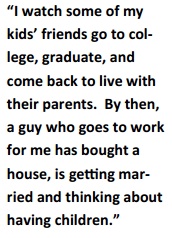What Are "Good" Jobs?
During the last year I’ve watched the conversation among economists and labor experts go from the traditional “Automation always destroy jobs but then it creates more jobs” to “Uh, maybe it’s different this time.”
It is different this time. Between robots, sophisticated artificial intelligence, and flexible global outsourcing, we’re going to eliminate a lot of jobs and it’s no longer clear where the new jobs--at least well-paying ones--will come from. A detailed Oxford University analysis last year said that nearly half of current jobs can be automated.
Coincidentally, over the last few months I’ve been working with a Minneapolis-based group called Nexstar, that helps home service providers--electricians, plumbers, heating and air conditioning contractors--manage their businesses. Their members are financially successful local companies, often with multiple locations.
One problem they share, however, is this: where is the next generation of their employees coming from?
Being a plumber or electrician is not a sexy job for kids growing up in a world of high tech billionaires. Yet these are jobs that can support a solid middle-class lifestyle. As one electrical contractor told me: “I watch some of my kids’ friends go to college, graduate, and come back to live with their parents. By then, a guy who goes to work for me has bought a house, is getting married and thinking about having children.”
My advice to these companies was that they need to tell a new story about jobs in the trades--not just to potential employees, but to teachers, school board officials and parents. The story has three parts:
--These are jobs that can’t be outsourced or automated. No matter how much Internet bandwidth you have, you’ll never be able to hire someone in Bangalore to change your kitchen faucets. And high on the list of jobs that can’t be done by robots involve physical dexterity in small spaces and flexible problem solving.
--These are jobs that, increasingly, use high technology like smart smart sensors and automated systems to control both electricity and plumbing. Home contractors are right at the interface between the physical world and the “Internet of things.”
--Finally, these are jobs that will help save the planet. We’re on our way to 9 billion humans by the middle of the century, many with middle-class lifestyles that will increasingly tax both our energy and water resources. By the Twenties, energy and water conservation will become major concerns--and an increasing part of electrical and plumbing and HVAC work.
In the United States educational system high schools measure their success by how many graduates go on to higher education. Yet many of those students fail to complete their degrees. And even if they do, four years of college may not give students much more than a lot of debt and a job at Starbucks. Maybe it’s time for policy-makers to broaden the definition of “a good job” beyond the confines of the office cubicle.

